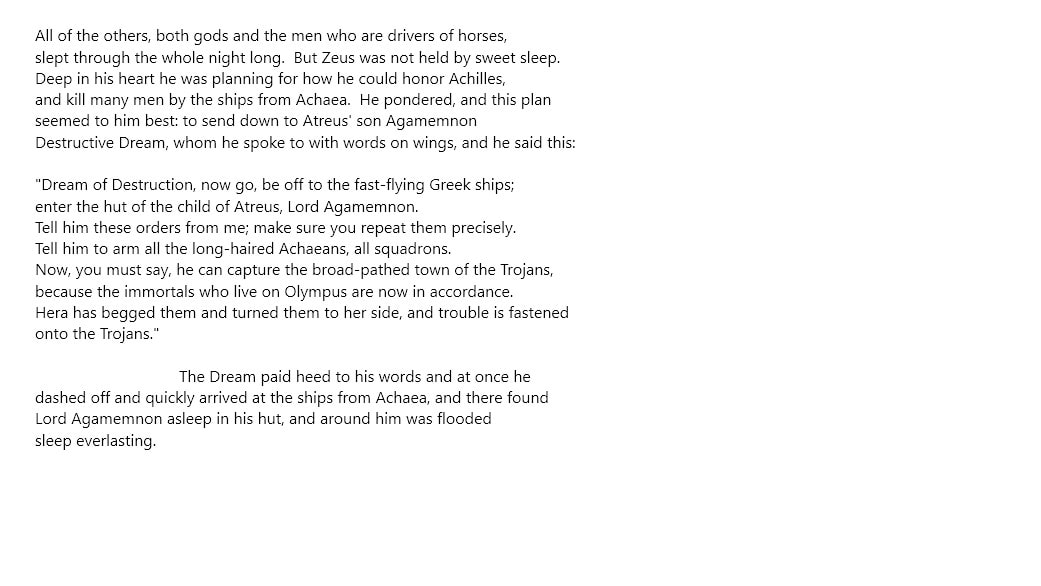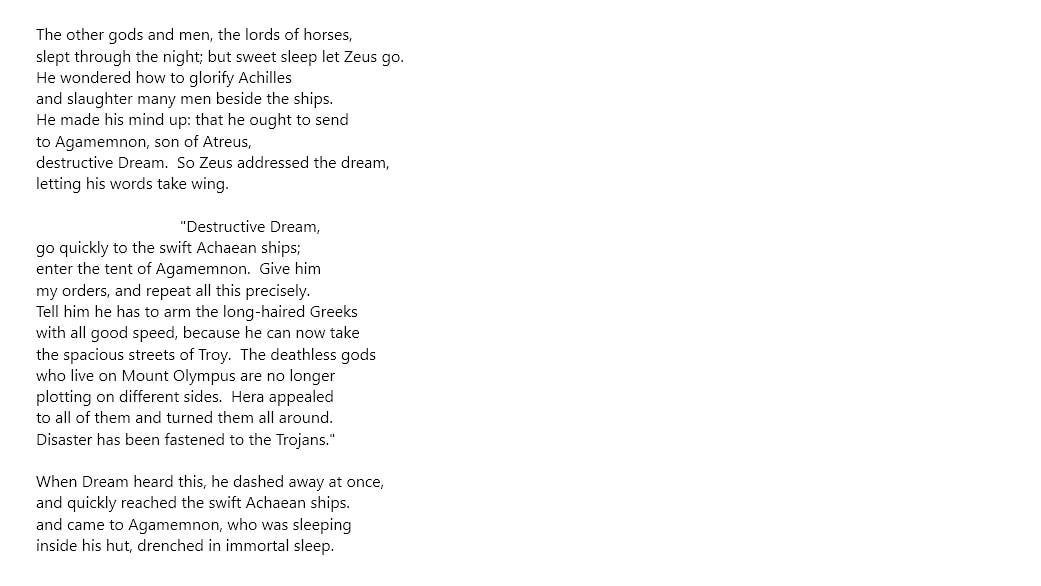

What’s the difference between “trouble” and “disaster”? For someone like Emily Wilson, it can mean everything. Fresh off her highly acclaimed translation of The Odyssey, one of The New York Times’ notable books of 2018, Wilson is now tackling The Iliad. She was kind enough to share a snippet from her work in progress.
Our conversation began with the topic of meter and then quickly found a rhythm of its own. We discussed toxic masculinity, pseudo feminism, and which pronouns are most appropriate for Homer. She explained what lessons we might take from The Iliad, and why the epic remains so compelling to the “emo teenager” in all of us.
—Ben Purkert for Guernica
Guernica: The two drafts are so different!
Emily Wilson: Well, that’s because I went back and forth on the line length while translating. It was so frustrating. I was in a real state of crisis.
Guernica: Why?
Wilson: I’d originally planned to use the same approach for The Iliad that I used for The Odyssey. With The Odyssey, I managed to preserve the same number of lines as the original while moving from hexameter to pentameter.
But when I tried applying the same constraints for The Iliad, I realized that it was not possible. The Iliad has so many more names! And the patronymics really matter, because the poem is all about fighting for your name and its honor. So I didn’t want to skip the names, but they have an awful lot of syllables. “Agamemnon, son of Atreus” takes up a whole line, for example. So I knew either I needed longer lines or a greater number of shorter lines. It’s a simple question that I spent months agonizing over.
Guernica: I prefer the shorter-line version. It sounds punchier to me, and the word choice does too. Instead of “trouble” awaiting the Trojans, it’s “disaster.”
Wilson: Right. And the word choice is influenced by the line length as well. When I was using the longer line, I was experimenting with a dactylic rhythm—which echoes the original Greek—rather than an iambic one. When I switched, I found more hard-hitting words in English were available to me.
Guernica: In your introduction to The Odyssey, you meditate on the question of authorship. Now that you’ve begun translating The Iliad, do you believe the two poems were written by the same person?
Wilson: I’m skeptical about using singular pronouns to describe Homer. I prefer to think of both compositions as the product of multiple people’s efforts.
At the same time, the two poems do have a unique sort of complementarity that might suggest certain things about their creation. They’re both preoccupied with questions of warfare and its aftermath, and what to do with warriors in a society that might want to destroy itself. Both reflect an awareness that these stories have been told for centuries, while still approaching the storytelling in novel ways.
Guernica: Are there any linguistic or syntactical tells that would suggest the same hand(s) at work?
Wilson: It’s hard to say, because they’re both so clearly based on oral tradition. The language of the two poems is a meld of different dialects coming from different parts of the Greek-speaking world, from different time periods. So scholars can’t confidently assert, “Oh, this word comes from X era or Y era.”
It also brings into question the whole issue of authenticity. There are people who would argue very strenuously that certain sections of The Iliad are later accretions, not part of the original work. For example, Book 10, in which Odysseus and Diomedes embark on their nighttime raid, seems different stylistically from the rest of the poem. But what does that say about what The Iliad really is? Is there such a thing as The Iliad minus Book 10? Maybe the logic of purity just doesn’t apply. Homeric poems are inherently works of revision. They didn’t even exist in an original form. They comprise many voices.
Guernica: Should that inform how we think about your role as a translator? If The Iliad is the work of multiple authors, rather than the brainchild of a single person, could one argue that you’re also one of its many authors? You’re separated from the others by millennia, but you’re also writing the poem alongside them.
Wilson: Well, I do think there’s an important distinction to be made. The Iliad as we know it has existed since at least the time of the library of Alexandria, where they held the first collation of the texts of Homer. So it has a long history as a written document.
Guernica: Is translation a more analytical or creative process for you? Do you find that you need to enter a poetic headspace?
Wilson: I myself am not a poet, but when I’m translating, I’m definitely paying a heightened attention to language. I suppose I’m a wannabe poet. I want every line to sound right; I want every word to fit perfectly. I’m not sure if that’s calling upon the muse, exactly. Maybe language is the muse.
Guernica: What is it that draws you to Homer specifically?
Wilson: When I was eight, I played Athena in an elementary school play. Then, in high school, I started learning Latin and Greek. I got to read little bits of Sappho and Euripides.
I found all the new poetic rhythms and images so exciting. They were so different from Shakespeare.
Guernica: Different in what sense?
Wilson: Just more raw. Maybe it was an emo teenager thing but I loved that the Homeric poems were so violent, so dark. That spoke to me.
I also loved Homer’s vision of the world in which the gods are frequently heartless and driven by their own whims. It felt much more truthful than the usual model of religion I’d been sold in school assembly.
Guernica: Ha.
Wilson: I’ve always been interested in the fact that the same Greek culture that conceived of gods in this way then produced Plato. It’s no accident, I think. Plato was able to articulate these profound questions about ethics in a whole new way, probably because the connection between ethics and religion had not yet been established. If you think about it, it’s not a given that the creation of the universe is connected to ideas of right and wrong. One could argue that the two have nothing to do with each other.
Guernica: That’s so interesting. So what can we learn from these gods and their immorality?
Wilson: I’m not sure. Maybe, if there’s one thing to focus on, it’s their interpersonal complexity, and especially their interest in the mortal world. It makes you think about what it would be like if you lived in a society where some had this enormous privilege, the privilege of living forever.
Guernica: And yet, at the same time, the gods are just like mortals. They have similar desires and frustrations.
Wilson: Sadly, it seems you can’t escape politics and social conflicts, not even in the divine realm.
Guernica: On the topic of divinity, I’d like to turn to your New York Times interview, in which you liken translation to a kind of religious practice. What role does faith play when you translate?
Wilson: Maybe a different way to frame the question is, who am I serving? When I translate, I don’t see myself as serving an individual named Homer. I see myself as serving multiple texts at the same time, both the original and also the text I’m trying to give birth to. I’m in service of both the past and the future.
Guernica: In that same interview, the Times referred to you as the first woman to translate The Odyssey, and I know many other outlets have really focused on this too. What has that been like?
Wilson: I’m grateful for the question. I should begin by clarifying that I’m the first woman to translate a complete edition of The Odyssey into English; other women have translated the poem into other languages. Some of the media coverage has made me uncomfortable, because it reflects Anglophone hegemony. Like, if it doesn’t exist in English, it doesn’t exist.
There’s also the issue of tokenism, as if you’d know absolutely everything you could possibly want to know about my interpretive and literary choices because of my sex. Which, of course, is absurd and rather pseudo-feminist. And yet I also recognize that a lot of the attention for the book was not unrelated to my being a woman. The media wouldn’t have cared otherwise.
Guernica: What impact did the success of your translation have on you?
Wilson: I was unknown before I published The Odyssey, and then suddenly I had a readership. I think about status very differently now as a result. Which is interesting, since The Iliad is all about status.
Guernica: Obsession with status feels like such a contemporary thing, but I guess it’s been with us since antiquity.
Wilson: Yes. Though I do think that The Iliad speaks to our current cultural moment quite powerfully. It might sound glib, but it really is a narrative centered around toxic masculinity. There’s this tendency of men to fight with each other for the sake of reputation. And then women often get raped and enslaved and killed as a byproduct. It’s a critical theme in the poem and it’s also a critical question in our world today, about how our politics might change if we didn’t have quite so many men jockeying for status in the government. What would happen if women were truly in charge? What would that world look like?
To read more interviews from our Back Draft archive, click here.
